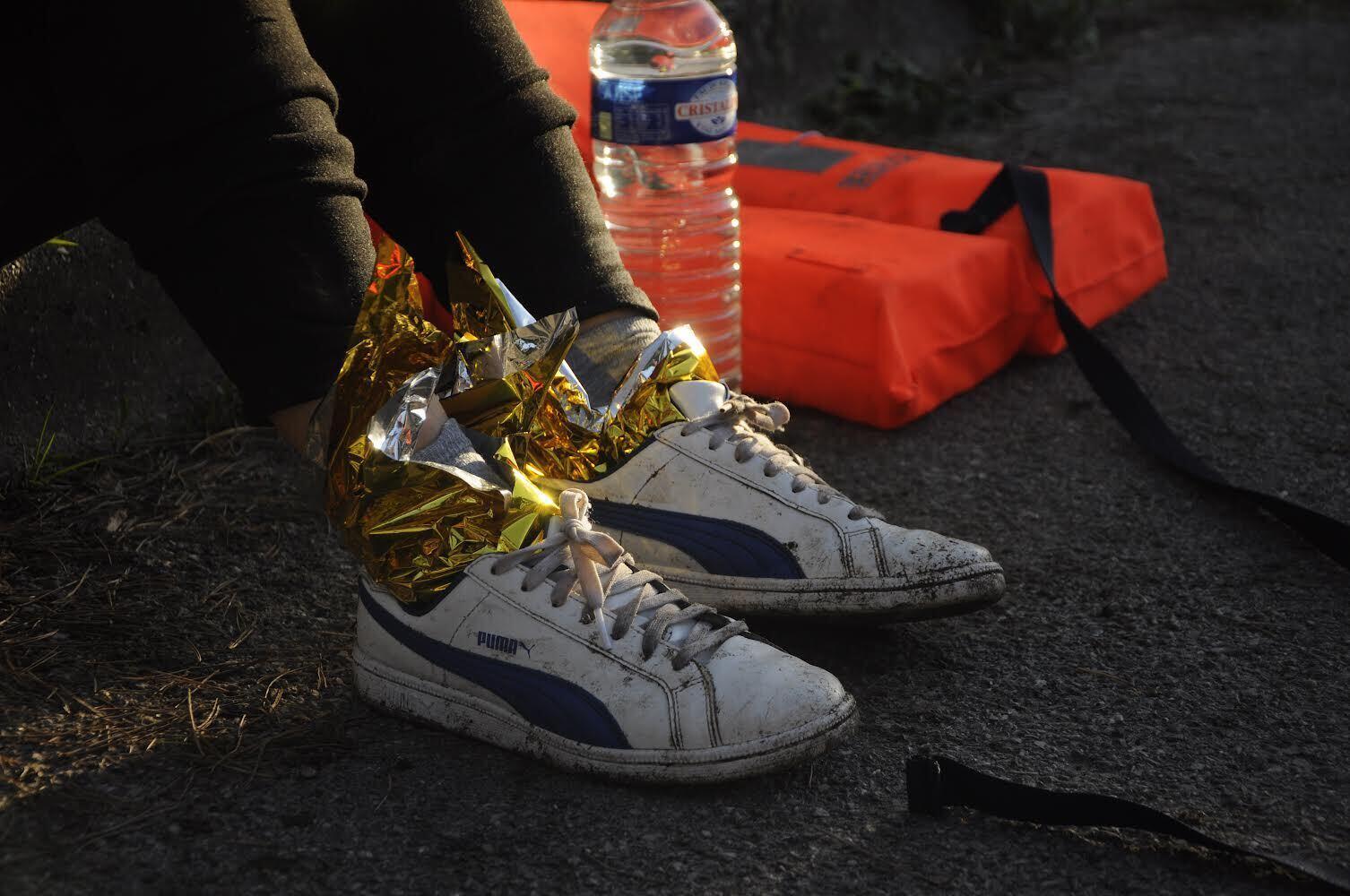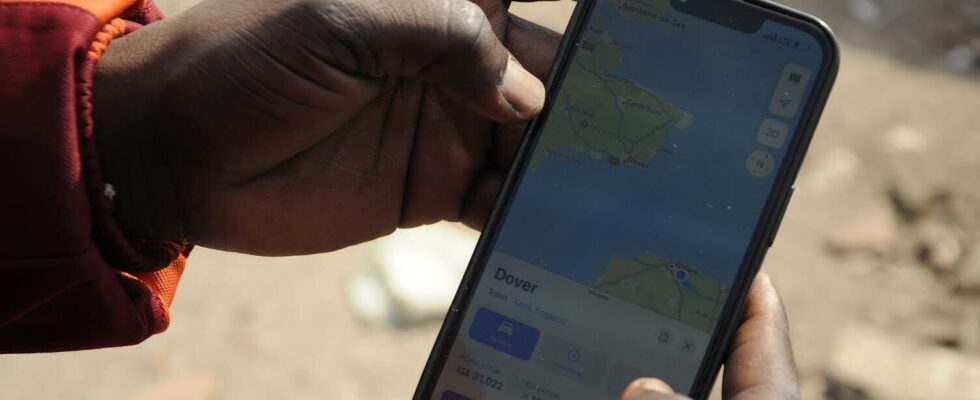Departures far from the coast, dangerous weather conditions, overloaded boats… Faced with the security of the Franco-British border, migrants are resorting to new ways of avoiding police checks and are putting themselves in increasing danger in the hope of crossing the Channel.
Mohamed still has wet sneakers. Staring into space, sitting on a wooden pallet in the camp where he lives, he repeats the same words. I’ll try again. I’ll try until I get it right. “The day before, the Nigerian, just in his twenties, tried to cross the Channel for the second time, from a beach in Calais.” Too many people wanted to board, it was impossible to put the boat in the water and the police arrived ” he says, looking helpless.
However, after leaving his country in August 2022 and crossing Niger, Libya, Italy and then the Franceit was impossible for him to back down from the last thirty kilometres that separated him from the British coast. A sweatshirt printed with the colours of the United Kingdom on his shoulders, he observes Dover on the maps of his phone. It’s so close. I’m sure it will be easier for me there. ” says the engineering student with a smile.
IfNineteen people have already died in its waters since the beginning of 2024.— compared to twelve for all of 2023, already making this year one of the deadliest — the Channel is no longer just a ” small river ” in the eyes of Mohamed, who has already crossed the Mediterranean. Like many other migrants forced to make the crossing, he says he is ready to try anything, including these new methods that are becoming more and more widespread: leaving from a distant town or from a river, regardless of the weather conditions or the number of people on board the boat. ” I’m not afraid to die there because I’ve seen plenty of people die before. “Starting with his father, assassinated in September 2012 by the jihadist group Boko Harambefore his child’s eyes. Stuck at the Franco-British border for over a month, he is preparing to leave 40 kilometers further south for his next attempt at crossing. I will try from Boulogne-sur-mer ” he says, confidently.
Read alsoRefugees: UNHCR ‘very concerned by increase in deaths at sea this year’
Leave at all costs
Ali* is leaning against a tin wall in the warehouse. Originally from Khartoum, he left Sudan seven months ago and has been trying to reach the UK for the past week. Wrapped up in his black down jacket, he says, have nothing left to lose “. Since the civil war broke out in April 2023his country has become a veritable powder keg. I lost my shop, several members of my family, my lifehe confides with dry eyes, as if accustomed. I just want to get away. No matter what the weather is like at sea, no matter how many people are on the boat… As soon as I have enough money, I will try to cross. » On the road to his exile, the 32-year-old Sudanese nevertheless recounts having survived a shipwreck where « forty ” migrants have lost their lives off the Libyan coast.
To help those whose crossing has just failed and dissuade them from putting themselves in further danger, Utopia 56 travels the 140 kilometres of coastline of Nord-Pas-de-Calais every night in good weather with a truck full of hot drinks and blankets. In recent months, the association’s volunteers have been surprised to see that, like Mohamed and Ali, migrants are taking more and more risks in the hope of one day setting foot on British soil. A year ago, we set up a coastal patrol as soon as we were less than 0.5 meters from the waves, the height of the emerged sausage of the zodiac, and 10 knots of wind.explains Célestin Pichaud, coordinator of the association in Grande-Synthe. Now, we are seeing departures with increasingly less clement conditions, from 0.8 meters of waves and 15 knots. ».

Move away to avoid law enforcement
Utopia 56’s phone is now ringing almost constantly with distress calls. One of them comes from Gravelines, 22 kilometres from Calais. Muhammad, 44, originally from Iraqi Kurdistan, walked sixteen hours with his wife and three children, aged nine to fourteen, to reach the departure point of their boat. They tried to cross three times in one day, without success. I have a health problem with my leg, it is very difficult for me to walk, but I have no choice if I want to avoid the police ” he says, his eyes dark and his face tired.
The migrants’ starting points are each time a little further away. At first, we only intervened in Dunkirk and Calais. Then we expanded to Boulogne-sur-mer, then further and further south, to Le Touquet.explains Célestin Pichaud, his hands tight on the steering wheel. We even received calls from Berck or Abbeville, in the Bay of Somme, more than an hour’s drive from Calais.. “If reaching Dover from Calais represents between six and ten hours of crossing according to the association, this duration would be multiplied by three from Le Touquet, 70 kilometers further south.” The problem is that a longer crossing time means a greater chance of having an engine failure, finding yourself adrift or having the boat get a puncture. »
Others are also trying to set sail from further inland, notably by embarking from the Aa Canal, which flows into the North Sea. This method is not without risk: on March 3, 2024, Seven-year-old Rola Al Mayali drowned there after his makeshift boat capsized thirty kilometers from the coast. This is the first departure I have seen so far from the coast. “, reacts Véronique Magnin, spokesperson for the maritime prefect of the Channel and the North Sea. ” These departures are very risky: the opening of the locks can cause a call for water and the canals which flow into the sea are emptied at low tide, so people can find themselves stuck in the mud. “, adds Célestin Pichaud.
” It is criminal to put so many people on a boat »
A risk that is all the greater as the boats are increasingly overloaded. In 2024, they will carry an average of 49 migrants — compared to 39 in 2022, or 7 in 2018. If there are more than 70 people on board, I don’t get on. “, Muhammad says, looking at his three children, determined to send them to school across the Channel. It is criminal to put so many people. With 70 people weighing 70 kilos on average, we are at 5 tons on a boat powered by a 30 horsepower engine, with few life jackets on the migrants’ backs. No one would dare venture there unless forced to. “, chokes Philippe Darques, president of the Calais sea rescue station.
Since the beginning of the year, the blacklist of deaths has therefore continued to grow: ” we are almost at one death per week “, breathes Flore Judet, member of the Auberge des migrants. For the associations, in the absence of ” safe and legal passageway “, it is the State which is directly responsible for this increase. ” The beaches are surrounded by CRS, gendarmes, drones, planes…complains Axel Gaudinat, coordinator of Utopia 56 in Calais. But people are not going to give up on crossing and are ready to do anything, because they have no other choice in the hope of a better life. »
+42% crossings in the first quarter of 2024
As proof, according to the figures released by the UKin the first quarter of 2024, 5,373 people had already crossed the Channel, compared to 3,793 in the same period the previous year – an increase of 41.7%. No matter what happens, people will try to cross. We have seen people try in inflatable canoes, or even by swimming. “, says Flore Judet.
For its part, if the maritime prefecture of the Channel and the North Sea recognizes a ” elongation “departure points and more overloaded boats, she considers dissuasive land measures necessary for ” rescue work “. ” It is important to limit departures at sea, because many do not know how to swim or are very poorly equipped. If we find ourselves with 50 boats at the same time with less than a hundred lifeguards, it is impossible to be in the right place at the right time. “, justifies Véronique Magnin. A fear that will not prevent Ali from attempting the crossing: ” Maybe tomorrow I will die in the water, but I want at all costs to study politics in the United Kingdom and change my country, which has nothing more to do with the Sudan that I know. »
* First name changed at the request of the person concerned.
Read alsoImmigration: Outsourcing asylum applications, a contagious temptation in Europe
